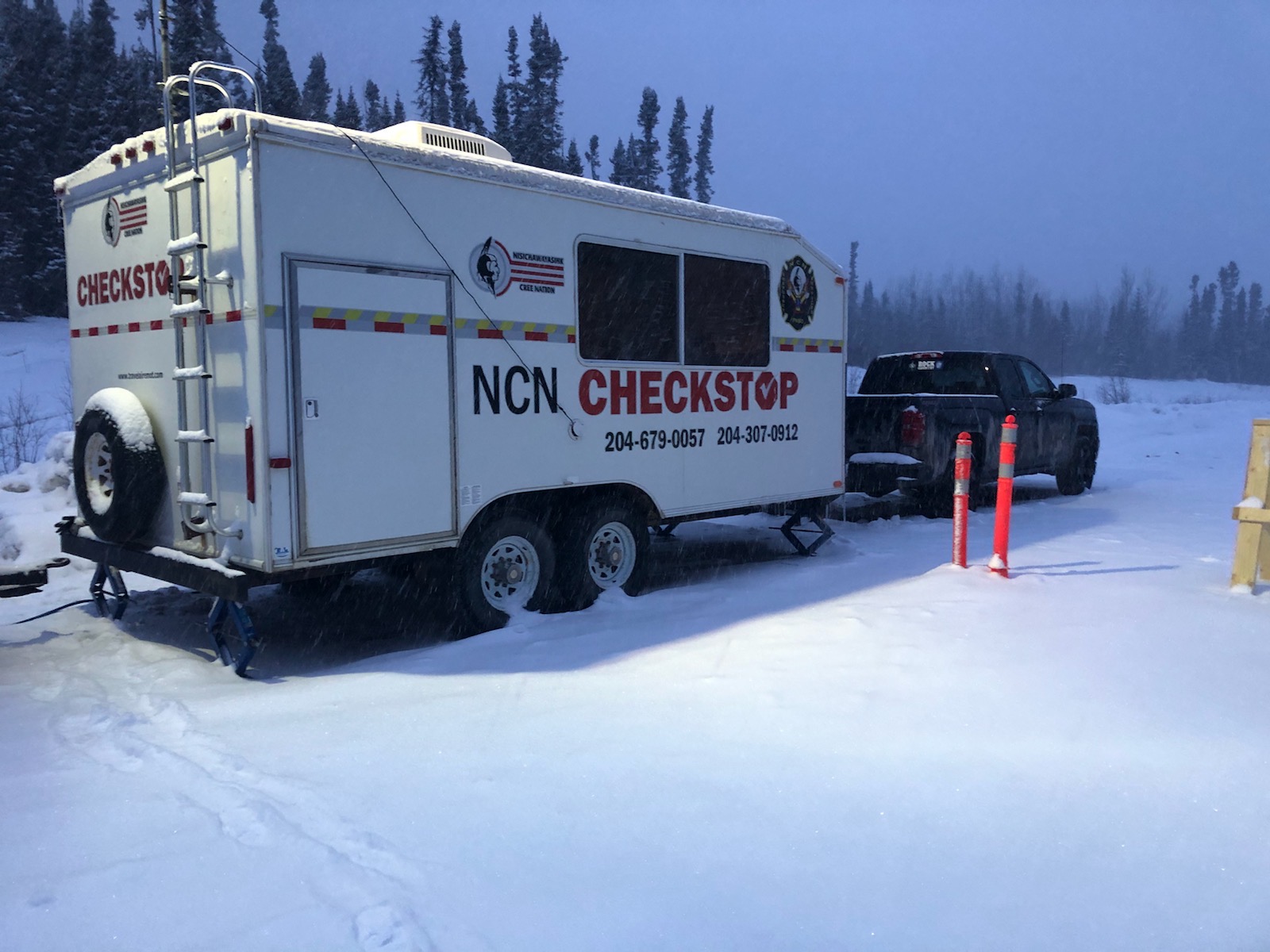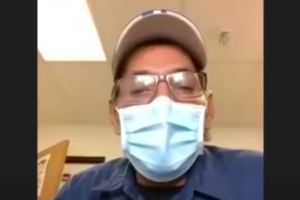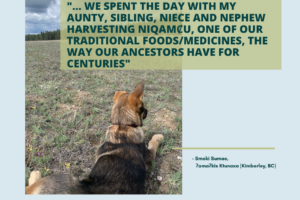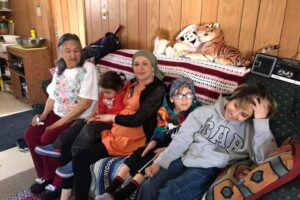Thoughts from quarantine in Nisichawayasihk Cree Nation
Isolation
Carol is from Nisichawayasihk Cree Nation (NCN), which is based in Nelson House, about nine hours north of Winnipeg and one hour west of Thompson, with a total population of about 4,600. She is a First Nations safety officer and also sits on the Wa Ni Ska Tan steering committee.
When I reached out to Carol, she was at the beginning of a mandatory 14-day isolation period in the community’s Atoskiwin Training & Employment Centre, since she had recently had to leave the community for a health appointment. The WiFi connection was spotty, so we connected by text. She explained how the community is only allowing people in and out for essential reasons, like medical appointments:

anyone who goes out of the community for medical has to go on isolation once they return from their appointment
and [if] you choose to leave, you have to sign a waiver form stating you’re leaving on your own and will not be allowed back in until further notice
Carol described her days in isolation, during which she is keeping a journal, and which she has been finding difficult:
This 14-day isolation is very hard because your limited to a lot of things especially the things you’re used to having
My days here in isolation don’t really have a time frame for me…all I do is count the days I have left night and day don’t really matter right now…I guess I can say so this is how it must feel being in jail or prison
I walk the hallways everyday doing 10 laps in the morning and 10 in the evening, I go outside when it’s nice out and I exercise in my room. I’m reading a lot and just writing things down, taking some pictures with my phone. At least I can say the room is nice and I have satellite and TV. We get three meals a day.

On her main concerns around the pandemic, Carol first referred to access to medical services:
One thing I have noticed through this all is that we were never prepared for a pandemic especially on First Nation communities: the supplies to protect ourselves aren’t really here and the medical personnel aren’t enough to be able to do everything if needed. The one hospital we have in northern Manitoba is the Thompson general hospital that oversees the whole northern area…so if there were ever an outbreak up here we’re screwed….
She also referred to the need for communities to share and communicate with one another:
I know our EMO [Emergency Operations] staff are helping other communities with their lockdowns and providing as much info to other neighbouring communities and it’s so important to reach out especially when other communities are also limited to medical supplies…or facilities for that matter
Carol is a frontline worker, a First Nations Safety Officer and had been staffing the community check point until she went into isolation?
It’s very hard for the frontline workers because of all the overtime we’re all doing and being away from our families for so many hours a day or night even working on our days off sometimes, and the frustration from the community members everyone is getting agitated and wants out. I feel for those who have addictions because as a First Nations safety officer I’ve seen what alcohol and drugs have done to our community and these drug dealers and bootleggers are still trying and getting the stuff in even around the blockade
But I love my community and the people I serve and not too many will do what we’re doing because of the risks and low pay and long hours
Food Security
NCN has its own store, but supplies have been running short as supplies sell out as quickly as they are delivered:
supplies were coming in and still do but not everything was provided such as the right size pampers or formula for babies, pads or tampons for women, bread was running out fast even meat products, fresh milk, so things are running out fast and it’s hard because the supplies trucks with food only come in two days of the week. Toilet paper is scarce.
So now if they have anyone who can pick up stuff for you in Thompson you can have them bring it to the blockade and someone pick them up on the other side
A few days later Carol said NCN is also arranging for people to go shopping in Thompson by providing busses, though it seemed like this was for a limited time.
The shortage has made even more people go out on the land for food:
as a community [we filled] all our country food freezers that provides wild meat, in case we’re on complete lock down and we run out of supplies in the store we have a lot of fish, moose, caribou meat for our people and we have a back up supply for each household of groceries in case they run out. Also individuals are setting snares to survive.
That’s one thing the outside world has forgotten us we as First Nations know how to live off of the land regardless of what happens, our teachings are still being practiced and passed on to our generations. These corporations may have destroyed our way of life but they never killed our spirit to survive off of the land…
Housing
Carol’s biggest concern around Covid is how it will affect people who are without a home or living in overcrowded conditions.
Our own people that are homeless and are living in the streets all over – some in Thompson, Winnipeg, Edmonton etc.—what’s going to happen to them if that corona virus hits Thompson? Because we do have many who live in the streets and live in the homeless shelter, but if there’s not enough room and they’re out and about and they end up getting the virus and they want to come home then what?
We will never know who is carrying the virus and if we let them come home because the virus hits Thompson, this can become a scary time for everyone because street people aren’t practicing social distancing and are basically sharing everything, so it’s scary…
and then we also have to deal with overcrowding in some homes, and this is one big problem all First Nations are facing right now
Homeowners in Nisichawayasihk Cree Nation have been told to limit households to ten people per house.
I think after all this I’m going to advocate for more funding for our nations right across Canada something has to be done. I sit on the housing board in my community and I see the issues we’re faced with and it’s all about the funding
Funding & Support
More funding and support is needed, Carol said, to deal with Covid and issues related to it:
I just got news that every household is getting $200 per house—that’s not enough especially when you have 8-20 people in some homes. That doesn’t even cover very much for families that have to feed other relatives or more children in a home,
It isn’t clear yet whether that $200/household comes from the community’s share of the $300 million federal funding package Indigenous communities received for dealing with Covid. Either way, it’s not enough.

She also spoke to more generally about the lack of funding and supports for northern communities:
what kind of services are being provided for our communities and remote communities as well
I know some funding was given and I feel it’s not enough especially when we have share funding with other communities – and will it actually be used where it’s supposed to go
Ultimately,
I also would like to see more supplies in our communities such as more essential supplies and medical supplies, even ventilation supplies just in case. Getting as much info out there and letting the members know they also have to do their part in preventing the spread as well just because it’s not here yet doesn’t mean we’re in the clear. Never put your guard down but keep your stance.
Everyone has to realize we have to make the right decisions for everyone’s well being not just for a few selected. Getting that message out to everyone to be safe and clean. I know things will get worse before it gets better and we don’t know when it’s going to change.
Carol just left quarantine on May 2, and will be heading straight back to working on the frontlines.




